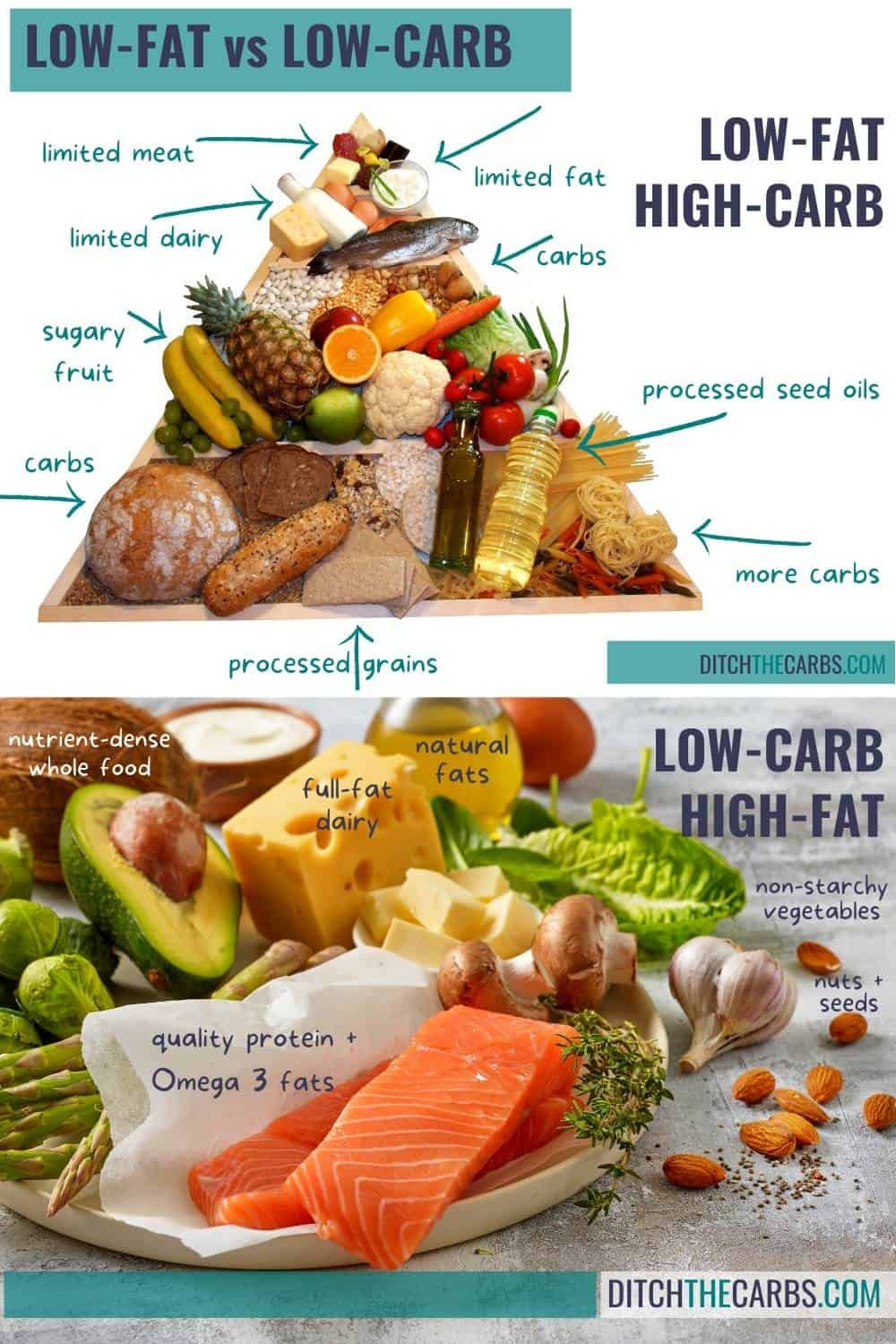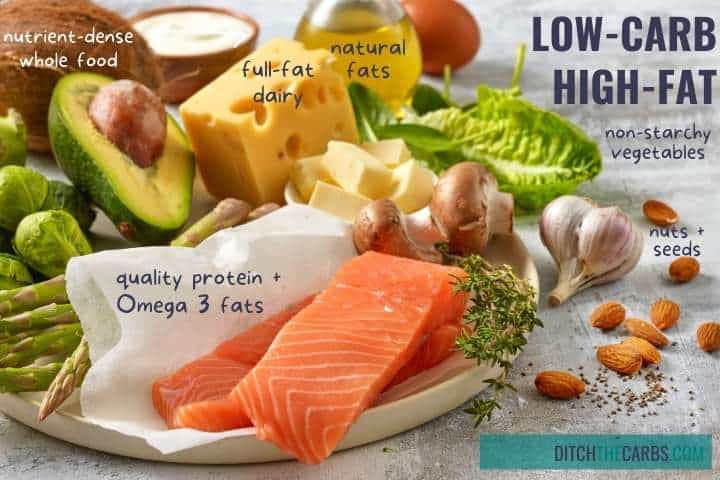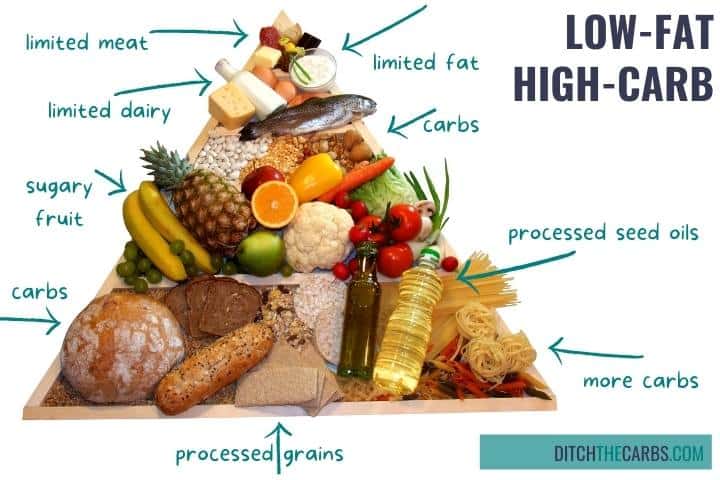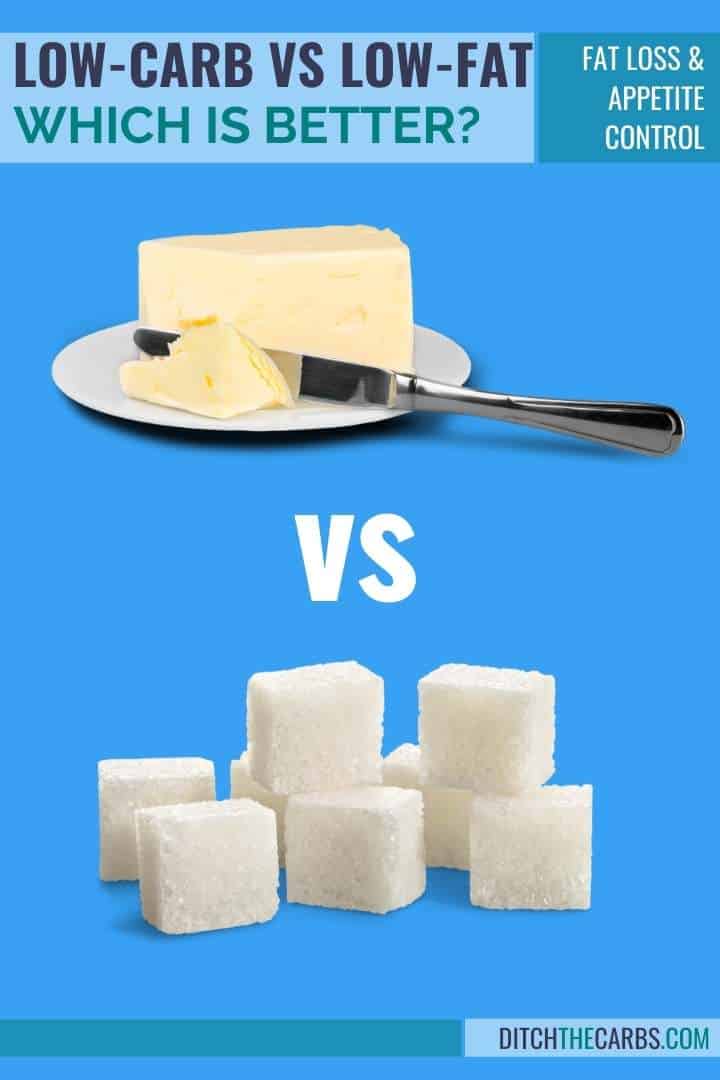Have you ever wondered what the difference is between a low-carb vs low-fat diet? Which is best?
Discover which diet is superior for fat loss, appetite control, improved mood, stable blood sugars, metabolic health, concentration, inflammation and overall health.

Watch the Fat v Carbs video and discover which diet REALLY is best … and why!
What Is Low Carb vs Keto?
When referring to a low-carb diet, people usually mean a low-carb, high-fat diet (LCHF) which is a diet that has fewer than 100 grams of carbs per day.
Are you ready to create the ultimate 12-month blueprint for reaching your health & weight loss goals this coming year?

Our free on-demand video training will walk you through how to make 2024 THE year you set health goals…and keep them.
Generally, a low-carb diet is considered to be:
- <100g/day = moderate low-carb
- <50g/day = low-carb
- <20g/day = keto
Keto Explained

The ketogenic diet is a type of very low-carb diet that keeps you in a state of nutritional ketosis (you become a fat burner, not a sugar burner) by limiting carbs.
To adhere to the keto diet which in turn promotes healthy, sustained weight loss and improved health, you’ll need to make sure that you are not consuming more than 20 grams of carbs per day.
Want to know what your daily protein target and carb limit looks like on your plate? Try the new keto and low-carb macro calculator here. It will give you guidance on your daily carbs, protein, and fat limits.
What Is A Low-Fat Diet?

When referring to a low-fat diet, people usually mean a high-carb, low-fat diet which involves 50% of daily calories from carbs and less than 15-20% daily calories from fat.
The standard food pyramid is a low-fat diet, with the majority of daily servings coming from carbohydrates, sugar and grains. Fat is limited and fresh vegetables and fruits are encouraged.
The main problem with a low-fat, high-carb diet, is the majority of calories come from carbs and it is almost impossible to have good blood sugar control.
In addition, low-fat, high-carb foods are processed. Where the fat has been removed to make a product “lite” or “light”, sugar and carbs are pumped back in to improve taste and texture.
In addition to this, most low-fat diets purposefully chronically restrict calories in an effort to achieve fat loss.
Low-fat diets and low-calorie diets will not keep you satiated and do not supply all the essential fatty acids your body requires.
Unfortunately, the quality of evidence that this approach is sustainable over the long term or is more effective than intermittent fasting and/or the keto diet, is weak, and may in fact promote weight gain.
Fat vs Carbs video
As the Fat v Carbs documentary suggests, when deciding which diet to follow, it’s all about weighing up the pros and cons and finding something that will be sustainable.
Low Carb vs Low Fat: Which is best?
In years past, the low fat, high carb diet gained traction among those seeking a clear way to shed fat and gain overall health. Saturated fat was considered the number one dietary villain and to be avoided at all costs.
Even today, you will still find a vast amount of low fat products in grocery stores, supported by the established dietary guidelines of many governments worldwide.
But is a low fat, high carb diet really the most efficient way to lose weight and improve overall health?
I think not. And it seems science agrees.
As more studies have been conducted and released, more evidence suggests that carbohydrates, not fat, have played a significant role in the global increase in obesity, diabetes, and other chronic health conditions.
Which Diet Is Best For Metabolic Health And Insulin Resistance?
It is carbohydrates that cause metabolic syndrome, insulin resistance, and hyperinsulinemia. These are all implicated in the big 4 – obesity, type 2 diabetes, heart disease, and cancer.
For this reason, many (including myself) have turned to a low-carb, high-fat diet and have experienced great success!
An increasing number of medical professionals are now using low-carb and ketogenic nutrition with their patients. Each month more research is published to support it being the superior method for weight loss and metabolic health.
Low fat or calorie counting diets do produce some initial weight loss, but it is often short-lived. The number one reason? These diets do not address the issue of hunger and metabolic health.
However, any dietary change compels a greater awareness of what is being consumed and the quantity consumed.
Let’s face it – any reduction of fast foods and processed or artificial foods through a dietary change will result in weight loss at the initial outset and a measure of improved overall health.
When comparing a low carb versus a low-fat diet, weight loss should be just one of many considerations though. After all, just because a diet achieves weight loss doesn’t necessarily mean that it also improves overall bodily health and function, or even prevents disease.

Benefits and Risks of a Low-Carb Diet
Let’s take a look at both the benefits and risks of this type of eating plan.
Benefits
Benefits of a low-carb, high-fat diet include:
- Fat-loss
- Reduced appetite
- Improved insulin sensitivity and metabolic health
- Reduced inflammation
- Fat oxidation (the process of breaking down fatty acids)
- Improved moods
- Better sleep
By reducing carbohydrates, the body switches from burning sugar as fuel to burning fat as fuel and you begin to produce ketones.
This state is called “nutritional ketosis”.
These ketones act as an incredibly clean energy source for your body and brain. They also perform important ‘signalling’ tasks, like dampening chronic inflammation (1).
When your body is fuelled by a keto diet, it switches from using glucose as its energy source to burning fat more efficiently. When you lower your dietary carbohydrates, you begin to use your glycogen stores and lower your insulin levels (the energy storage hormone).
You can then achieve stable lower blood glucose levels and your body will switch from being a sugar burner to a fat burner.
When you are fuelled by ketones, you experience more stable energy levels, improved mood, decreased hunger, reduced inflammation, and incredible mental clarity. No more afternoon energy slumps!
Risks
It’s clear from the Fat v Carbs video below that one of the main misconceptions of a low-carb, high-fat diet is that the higher level of fat is responsible for fat storage in the body leading to unhealthy high cholesterol, weight gain, and heart disease.
In actual fact, it’s quite the opposite.
Sticking to a low-carb, high-fat diet has the ability to lower unhealthy cholesterol as proven through the 3-week LCHF diet experiment documented in the Fat v Carbs video, promotes weight loss and reverses insulin resistance which is great news for type 2 diabetics!
Benefits and Risks of a Low-Fat Diet
Put plainly, low-fat, high-carb diets are much less popular these days owing to evidence of links to obesity, diabetes, heart disease, and even cancer.
That’s not to say though that you can’t lose weight on a low-fat, high-carb diet or that it will destroy your health.
Benefits
Many people have found profound weight loss using a low-fat diet, but the research is beginning to limit other health claims and benefits.
Risks
In some cases where individuals are very active or under substantial stress (physical or mental), reducing calories at the same time can further add to the negative effects of stress. A study has shown that restricting calories is ineffective because it adds to chronic psychological stress and cortisol production.
Both are factors in weight gain!
Eating too many carbs spikes blood sugar levels and leads to insulin resistance. This can result in increased inflammation in the body and the onset of pre-diabetes and type 2 diabetes over time.
Certain carbs such as fructose (found in table sugar), high-fructose corn syrup, and most fruits, can increase visceral fat (the type of body fat that’s stored within the abdominal cavity around organs) which is linked to high levels of inflammation and heart disease.
For women, eating high-glycemic carbs, too many carbs, and too little fiber can also increase the risk of polycystic ovarian syndrome (PCOS).
Which Diet is Best?

While each diet has its own list of pros and cons, knowing what you want to achieve (i.e. weight loss) will help you determine whether to follow a low-carb or low-fat diet.
Goal: Fat-Loss
A low-carb diet focuses on a restriction of carbs rather than a total reduction of calories as is typical with a low-fat diet, making the low-carb diet more sustainable for many in the long term and mitigating against reduced metabolism through chronically limiting calories.
In addition to this, low-carb diets like keto cause the body to burn fat as fuel rather than sugar from carbohydrates, further promoting fat loss while still enabling you to retain lean muscle mass.
Goal: Reduced Appetite and Improved Satiety
Diets higher in fats reduce appetite and increase satiety which means that you are less likely to break your diet. In fact, high-fat diets can be so filling that some lose weight without counting calories.
Unfortunately, the same cannot be said for diets higher in carbs which can increase appetite, leading to fat gain from overconsumption.
Goal: Good Physical Performance
Improved fat oxidation from following a low-carb, high-fat diet such as keto can increase physical performance, reduce inflammation, and aid muscle recovery.
It is suggested that eating carbs is necessary for sporting activities and strength training although you don’t need to eat high-carb regularly to improve your performance.
It is quite possible to eat a low-carb, high-fat diet most days and then use a cyclical keto diet strategy which allows you to fuel up on hard training days and before sports competitions.
Goal: Balanced Hormones
As people need enough fat and cholesterol to produce enough hormones, sticking to a low-fat, high-carb diet can result in hormonal imbalances in estrogen and testosterone.
Insulin resistance from low-fat, high-carb diets can also give rise to hormone imbalances and fertility issues.
Reducing carbs may reduce insulin resistance, reduce inflammation and stabilise hormones in women with PCOS.
Goal: Stable Blood Sugar, Increased Insulin Sensitivity, and Diabetes Prevention
A low-carb, high-fat diet improves insulin sensitivity which is essential in preventing type 2 diabetes or improving your health should you already have T2 diabetes by lowering blood glucose and reducing insulin resistance.
Goal: Reduced Inflammation and Good Heart Health
Contrary to popular belief, eating saturated fat is not associated with heart disease. On the other hand, your carbohydrate intake, especially the number of processed grains you eat, may increase your risk of heart problems.
High-fat diets can increase good cholesterol, reducing the risk of premature death.
Goal: Good Brain Health and Dementia Prevention
Insulin resistance, oxidative stress, and inflammation can cause brain fog, dementia, and other neurodegenerative disorders which is more reason to follow a low-carb, high-fat diet.
Brain health is also closely attributed to increased levels of good gut bacteria, achieved through a low-carb, high-fat diet.
Goal: Cancer Prevention
Most cancers thrive on the metabolism of sugar which makes a low-carb, high-fat diet the preferred diet for cancer prevention and to be used alongside cancer treatments.
Conclusion: Low-Carb vs Low-Fat
To summarise, low-carb and ketogenic diets are shown to produce more rapid and sustained weight loss, improved metabolic health, increased insulin sensitivity, reduced heart disease risk, reduce inflammation, improved sleep, better appetite control, better blood sugar control, and improved overall health.
It’s clear that low-fat, high-carb diets simply don’t offer the same range of health benefits as low-carb, high-fat diets do which is evident from the increase in obesity and rise of diseases since the low-fat, high-carb diet movement and endorsement by governments around the world.
Regardless of which diet you choose, make sure to add exercise, don’t overeat, and try to manage your stress levels.
Consistency is key, so make sure to adjust your mindset to adopting healthier choices long-term.

References:
- The ketone metabolite β-hydroxybutyrate blocks NLRP3 inflammasome–mediated inflammatory disease
- Reducing Calorie Intake May Not Help You Lose Body Weight
- Low-Calorie Dieting Increases Cortisol
- The Effect of Low Carbohydrate Diet on Polycystic Ovary Syndrome
- Source and amount of carbohydrate in the diet and inflammation in women with polycystic ovary syndrome
- Effects of low-carbohydrate and low-fat diets
- The Warburg Effect: How Does it Benefit Cancer Cells?
Get our FREE guide to finally fix your metabolism!
Losing weight & getting healthy is never easy, but lately you might feel like it’s suddenly become impossible.
Our Flip the Switch guide will help you clearly understand what’s been going on, as well as exactly what you can do to get your metabolism working again so that you can look and feel your best—it’s easier and more simple than you think!

















